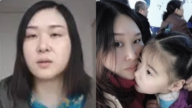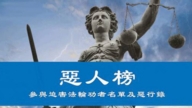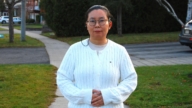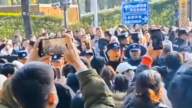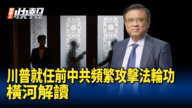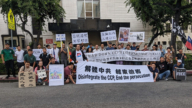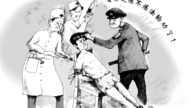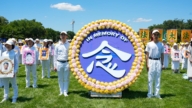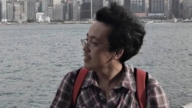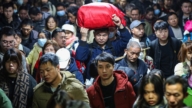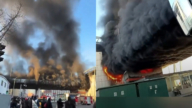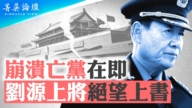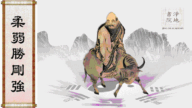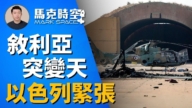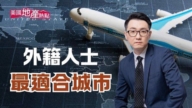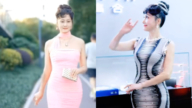【新唐人2013年10月05日讯】10月1号,这个原本被中共命名为“国庆”的日子,在它64岁生日时,迎来了一个中国百姓为它取的新名字——“全民受难国殇日”,来自大陆各地的访民抗议中共奇招尽出,送给中共的“生日礼物”是各种传单、条幅、状衣,甚至还有挽联、哀悼贴、遗照以及骨灰盒,送给它的“祝福语”也不是“生日快乐”而是“打倒共产党”。
今年“十一”期间的北京异常的热闹,大批来自中国各地的访民,接连不断的涌向天安门、中南海等地鸣冤抗议。与往年不同的是,今年的访民的上访规模、上访地点、表达诉求方式以及思想等方面都发生了较大的变化。
《六四天网》创办人黄琦:“最大的特点就是说,前往敏感地区的人数,较之于去年大幅度增加,很多民众是逼得走投无路,必须要铤而走险了。”
武汉人权活动家秦永敏:“那些长期坚持抗争的访民,他们的斗志越来越强,越来越不害怕打压,所以就发生了往年没有发生过的,成规模的到天安门广场或者中南海新华门门口,采取同时各种非常具有震撼性,但同时又低烈度抗争,像撒传单、放鞭炮、喊口号啊这样一些事情。”
据报导,从10月1号起,天安门前每天“炮声”不断,甚至有访民还燃放了24响的礼花炮,令中共警察惊恐万分,如临大敌。10月3号中午,山东枣庄访民李玉抱着四个月大的儿子在天安门放鞭炮,遭到警察当众殴打,随后警方将李玉连同婴儿一起关押长达十多个小时,引发了社会关注。
山东枣庄访民李玉:“警察都过来了,一下把我头按到在地,把我的双手直接带上手铐,然后就把我拖上他们的警车了,当时孩子在身边,我一直哭喊着‘我的孩子’,我怕我孩子丢了。”
常年上访的访民们在多次被抓、被截、被殴打、被关押后,已经对当局彻底失望,不再抱有任何幻想,他们开始将申述冤情的对像由政府部门转向了民间和海外媒体,申述地点也从政府部门转移到了天安门和中南海等大量公众聚集的敏感地区。
李玉:“因为鞭炮对这些民众造不成伤害,我不想伤及无辜。主要是有摄像的嘛,在那个地方人多,引起民众的注意,造成舆论的压力,给地方政府施压,主要是想达到这个目的。”
除了轰轰的“炮声”,漫天的传单也成为了天安门的一大“景观”,据目击者说,仅10月1号下午4点到5点半,一个半小时的时间内,就有来自黑龙江、上海等地的四波访民前往天安门撒传单,甚至还有访民从天安门前经过的公交车里向外抛洒传单,令警察和便衣们防不胜防、手忙脚乱。
此外,访民们还采取了堵路、唱歌跳舞、跳金水桥、裸奔、捧骨灰盒等各种“另类”方式来宣泄对当局的不满。为了不再像往年一样被集体抓捕,访民们不再大量聚集在同一个地区,而是化整为零,和当局打起了游击战。
黄琦:“从抗争的角度来说的话,民众的恐惧心理正在逐渐消除,他们较之以前更加无畏的反映自己的诉求。目前民众这种手法是很多的。”
中共的压迫,使得越来越多的民众加入了访民的群体,原本只懂得逆来顺受的访民大军迅速向成熟蜕变。
李玉:“我觉得现在已经把老百姓逼得,官逼民反,民不得不反的地步了,没有选择了,老百姓没有选择了,只能起来反抗。”
越来越多民众期待,十一“国殇日”这一天,成为全民汇聚声讨中共的“倒台日”。
采访编辑/张天宇 后制/钟元
Petitioners Protest Creatively On China’s “National Shame Day"
October 1st is named “National Day" by the Chinese
Communist Party (CCP).
However, the 64th anniversary of Communist China has been
given a new name from Chinese people; National Shame Day.
During the “National Day" holidays, petitioners from all over
China protested against the party using innovative means.
The “birthday presents" they gave to the party include flyers,
banners, slogans, clothing with written complaints, and elegiac
couplets, mourning posts, coffin portraits and cremation urns.
The “blessing words" to the party are also not “Happy Birthday"
but “Overturn the Communist regime".
The “National Day" holidays this year have made Beijing
an unusually bustling city.
Petitioners from all over China have en mass continuously
visited places such as Tiananmen Square and Zhongnanhai.
They voiced grievances or made protests.
Compared to previous years, there are great changes in many
aspects of those activities, such as the number, locations,
means of expression and petitioners’ mindsets.
Huang Qi, founder of human rights website 64Tianwang.com:
“The most prominent change is that the number of petitioners
going to’sensitive areas’ has significantly increased compared
to last year.
Many people have been driven to desperation
and have to make more risky moves."
Qing Yongmin, human rights activist in Wuhan:"Petitioners
who have struggled for a long time are becoming stronger in
mind, and less afraid of suppression.
Therefore we have seen never-before large-scale protests
at Tiananmen Square or the Xinhua Gate of Zhongnanhai.
Protests were also performed in very eye-catching but less
intensive ways.
They included scattering flyers, throwing firecrackers
and shouting slogans."
It was reported that, since October 1st, the “explosion
sounds" have never stopped at Tiananmen Square.
Some petitioners even set off firework-like firecrackers,
which frightened police and made them very nervous.
At noon of October 3rd, a Shandong petitioner Li Yu set off
firecrackers with her 4-month baby at Tiananmen Square.
Li Yu was then beaten by police in public, and was detained
with her baby for more than ten hours.
Her experience has drawn a lot of public attention.
Li Yu, petitioner from Zaozhuang, Shandong: “All the police
came to me and pressed me on the ground by my head.
Later I was handcuffed and forced into their police car.
My child was beside me when this happened.
I kept crying 'My child!' because I was afraid of losing baby."
After being intercepted, beaten and detained many times,
veteran petitioners have lost their last illusionary hope of
the CCP regime.
They are changing their petitioning targets from government
agencies to ordinary Chinese people and foreign media.
Petitioning locations have also changed from offices to
sensitive public areas with large crowds such as Tiananmen
Square and Zhongnanhai.
Li Yu:"I use firecrackers because they won’t injure the public.
I don’t want to injure innocent people. Another reason
is that there are many tourists making video-recordings.
There are large crowds and it is easy to draw attention and
create pressure on local governments. That is my primary goal."
Besides firecrackers, “flying" flyers also become a featured
sight at Tiananmen Square.
Witnesses reported that, only between 4pm and 5:30pm of
October 1st, there were four waves of petitioners from
Heilongjiang or Shanghai scattering flyers at Tiananmen.
Some petitioners even did the scattering work from buses
passing the square, which was too difficult to guard.
This left both uniformed and plainclothes police in a flurry.
Petitioners also expressed their grievances against the CCP
in the following “creative" ways:
Road-blocking, singing and dancing, diving from Jinshui Bridge,
streaking and holding cremation urns.
To avoid being captured in large groups easily, this year
petitioners no longer gathered together at a single place.
Instead, they acted separately and played a “bush
fighting game" with the CCP.
Huang Qi:"Talking about fighting against the authority,
Chinese people are feeling less fearful to do this.
They are appealing more aggressively than ever. Currently
they have created many different ways to do that."
The CCP’s suppression has forced more ordinary Chinese
people to join the group of petitioners.
In the meantime, petitioners that only knew to be resigned
to anything are also quickly growing up in their minds and acts.
Li Yu:"I think now the situation has already been like that
the government is acting so badly that they are simply
forcing civilians to resist it.
There is no other choice.
Ordinary people have no choice but to resist.“
In conclusion, more Chinese civilians now wish that “National
Shame Day" of October 1st will become the CCP’s “Downfall
Day" under resistance from the entire Chinese people.


